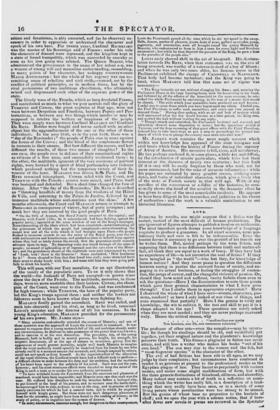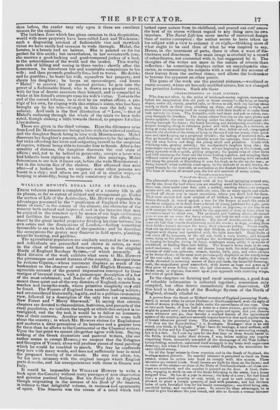LOTH.
JUDGING by results, one might suppose that a fiction was the easiest, instead of the most difficult of human productions. No one ignorant of figures attempts to publish a treatise on arithmetic. The most impudent quack deems some knowledge ot' a language requisite to produce a grammar. In all exact sciences, some pre- liminary study and care is felt to be indispensable. Even the tourist deems it necessary to go over the ground of his travels ere he writes them. But, misled perhaps by the term fiction, and supposing that there is no difference between truth and matter-of- fact, all think they are equal to a work of fancy. If they have had no experience of life—is not invention the soul of fiction ? If they have mingled an " the world "—who but they, for knowledge of human nature ? And they never pause to question the difference between seeing in parties the outward forms of society, and en- gaging in its actual business, or feeling the struggles of conten- tion. the pangs of sorrow, and the changeful violence of passion. Or, should they haw acted and suffered, vanity forbids them even to ask the questions—Have I the discrimination to note those points which gave their general characteristics to what I have gone through? Can 1 clothe them in appropriate expression ? Have I observed the whole of what I have seen—events, characters, pas- sions, conduct? or have I only looked at one class of things, and even examined that partially ? Have 1 the genius to vivify my
knowledge, the wit to enliven it, the tact and skill to put it in a shape adapted to the age ? These questions are rarely asked when they are most needed ; and they are never perhaps answered truly. Hence the critical reason, why
" rnediocribus esse poets
Non homines, non Dl, non coneessere column."
The professor of other arts—even the compiler—may be reputa- ble; for though his stealings should be old, and unskilfully put together, yet their original nature and the plunderer's knowledge preserve their truth. This fitness a plagiarist in fiction can never attain, and still less a writer who makes his books "out of his own bead." The one may rise to the woman and the fish, but " vante fingentur species" is the character of the other.
The evil of bad fictions has been rife in all ages, as we may judge by their complaints; but circumstances have combined to render it as grievous at present to the professional reader as the Egyptian plague of lice. They haunt us perpetually with various names, and under some slight modifications of form, but with the three generic distinctions of falsehood, silliness, and absurdity. Many indeed may contain a bit of truth in a reflection on some- thing which the writer has really felt, in a description of a land- scape that may really have been seen, or in a sketch of some living person whose peculiarities were too strong to be missed. But the grains of wheat bear no proportion to the bushels of chaff; and we open the year with a solemn notice, that if here- after fewer new novels or poems are reviewed in the Spectator
than before, the reader may rely upon it there are excellent reasons for the omission.
The luckless Love which has given occasion to this disquisition, would with more propriety have been called Lust and Weakness: such a disgusting account of fashionable vice and mawkish virtue we have rarely had occasion to wade through. Mabel, the heroine, is a beauty and an heiress. She is painted as far too perfect for this earth; but nevertheless, in her seventeenth year, she marries a good-looking and good-tempered jockey of a lord, to the astonishment of the world and the reader. This worthy gets sick of billing and cooing in three weeks : shortly after the honeymoon, he introduces low and unsuitable companions to his wife ; and then proceeds gradually from bad to worse. He drinks and he gambles; he beats his wife, squanders her property, and cheats his daughter ; he keeps an opera-singer, and forces " Mabel " to receive her at musical parties; he gets into the power of a fashionable friend, who is drawn as a greater rascal, with far less of decent manners than himself, and is compelled to winks at his friend's attempts upon his wife's virtue. Towards the end of the second volume, he is shot by an orphan officer, a pro- of his own, for eloping with this orphan's sister, who has been brought up by his wife—though in this case the lady is the seducer. And such is the first illustration of " Love;'—that of Mabel's enduring through the whole of the trials we have indi- cated, though sinking a little towards theend, to prepare fur other i.lustrations.
These are given in the third volume. Here the dilemmas arise from Lord De Montmorency being in love with the widowed mother, and the daughter Sarah being in love with Montmorency. Mabel discovers her daughter's passion, and determines to be the sacrifice; but risks offending her lover and subjecting herself to the suspicion
of caprice, without being able to transfer him to Sarah. After a due quantity of distress, the daughter discovers the real state of affairs ; and, not to be behind in generosity, accepts a lover who had hitherto been sighing in vain. After this marriage, Mabel determines to see how it turns out, before she weds Montmorency ; but in the interim dies of the cholera. Her affianced dies soon after—of a broken heart, we suppose; some other persons are burnt in a ship ; and others are got rid of in similar ways,—a keeping in absurdity, being he only consistency of the book.
































 Previous page
Previous page